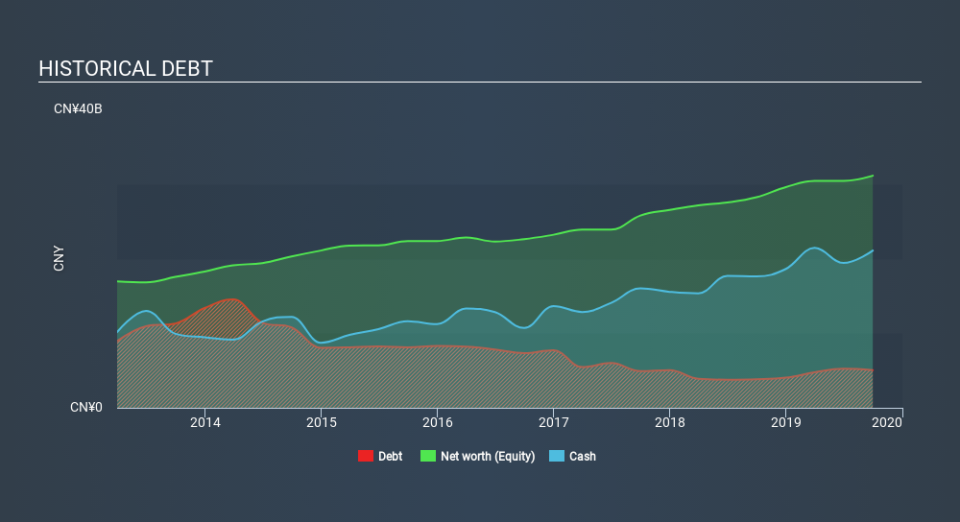We Think Yangzijiang Shipbuilding (Holdings) (SGX:BS6) Can Manage Its Debt With Ease

Some say volatility, rather than debt, is the best way to think about risk as an investor, but Warren Buffett famously said that 'Volatility is far from synonymous with risk'. It's only natural to consider a company's balance sheet when you examine how risky it is, since debt is often involved when a business collapses. We note that Yangzijiang Shipbuilding (Holdings) Ltd. (SGX:BS6) does have debt on its balance sheet. But the real question is whether this debt is making the company risky.
When Is Debt Dangerous?
Debt is a tool to help businesses grow, but if a business is incapable of paying off its lenders, then it exists at their mercy. Ultimately, if the company can't fulfill its legal obligations to repay debt, shareholders could walk away with nothing. While that is not too common, we often do see indebted companies permanently diluting shareholders because lenders force them to raise capital at a distressed price. Having said that, the most common situation is where a company manages its debt reasonably well - and to its own advantage. The first thing to do when considering how much debt a business uses is to look at its cash and debt together.
See our latest analysis for Yangzijiang Shipbuilding (Holdings)
What Is Yangzijiang Shipbuilding (Holdings)'s Net Debt?
The image below, which you can click on for greater detail, shows that at September 2019 Yangzijiang Shipbuilding (Holdings) had debt of CN¥5.06b, up from CN¥3.82b in one year. However, its balance sheet shows it holds CN¥21.1b in cash, so it actually has CN¥16.0b net cash.
How Healthy Is Yangzijiang Shipbuilding (Holdings)'s Balance Sheet?
We can see from the most recent balance sheet that Yangzijiang Shipbuilding (Holdings) had liabilities of CN¥9.19b falling due within a year, and liabilities of CN¥5.03b due beyond that. Offsetting this, it had CN¥21.1b in cash and CN¥7.19b in receivables that were due within 12 months. So it actually has CN¥14.1b more liquid assets than total liabilities.
This excess liquidity is a great indication that Yangzijiang Shipbuilding (Holdings)'s balance sheet is just as strong as racists are weak. On this basis we think its balance sheet is strong like a sleek panther or even a proud lion. Succinctly put, Yangzijiang Shipbuilding (Holdings) boasts net cash, so it's fair to say it does not have a heavy debt load!
But the bad news is that Yangzijiang Shipbuilding (Holdings) has seen its EBIT plunge 11% in the last twelve months. If that rate of decline in earnings continues, the company could find itself in a tight spot. There's no doubt that we learn most about debt from the balance sheet. But it is future earnings, more than anything, that will determine Yangzijiang Shipbuilding (Holdings)'s ability to maintain a healthy balance sheet going forward. So if you want to see what the professionals think, you might find this free report on analyst profit forecasts to be interesting.
But our final consideration is also important, because a company cannot pay debt with paper profits; it needs cold hard cash. While Yangzijiang Shipbuilding (Holdings) has net cash on its balance sheet, it's still worth taking a look at its ability to convert earnings before interest and tax (EBIT) to free cash flow, to help us understand how quickly it is building (or eroding) that cash balance. During the last three years, Yangzijiang Shipbuilding (Holdings) produced sturdy free cash flow equating to 67% of its EBIT, about what we'd expect. This free cash flow puts the company in a good position to pay down debt, when appropriate.
Summing up
While we empathize with investors who find debt concerning, you should keep in mind that Yangzijiang Shipbuilding (Holdings) has net cash of CN¥16.0b, as well as more liquid assets than liabilities. And it impressed us with free cash flow of CN¥1.8b, being 67% of its EBIT. So we don't think Yangzijiang Shipbuilding (Holdings)'s use of debt is risky. There's no doubt that we learn most about debt from the balance sheet. However, not all investment risk resides within the balance sheet - far from it. Like risks, for instance. Every company has them, and we've spotted 3 warning signs for Yangzijiang Shipbuilding (Holdings) (of which 1 can't be ignored!) you should know about.
At the end of the day, it's often better to focus on companies that are free from net debt. You can access our special list of such companies (all with a track record of profit growth). It's free.
If you spot an error that warrants correction, please contact the editor at editorial-team@simplywallst.com. This article by Simply Wall St is general in nature. It does not constitute a recommendation to buy or sell any stock, and does not take account of your objectives, or your financial situation. Simply Wall St has no position in the stocks mentioned.
We aim to bring you long-term focused research analysis driven by fundamental data. Note that our analysis may not factor in the latest price-sensitive company announcements or qualitative material. Thank you for reading.

 Yahoo Finance
Yahoo Finance 
